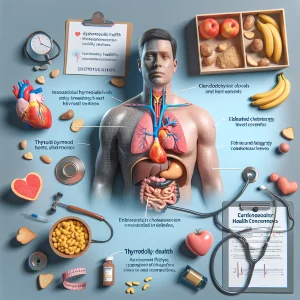Uncover the Critical Health Risks Associated with Hypothyroidism in Men
Hypothyroidism in men represents a serious health concern that stems from the thyroid gland’s failure to generate sufficient amounts of vital hormones, especially thyroxine (T4) and triiodothyronine (T3). These hormones are crucial for a myriad of bodily functions, including regulating metabolism, maintaining energy levels, and ensuring overall vitality. Although hypothyroidism can affect anyone, men often face distinctive symptoms and challenges that can drastically diminish their quality of life. Understanding this condition is vital for effective treatment and long-term management.
Identifying the specific signs and symptoms of hypothyroidism is imperative for implementing effective treatment and management strategies. Men frequently underestimate the implications of this condition due to the often subtle manifestations, mistakenly attributing them to stress, changes in lifestyle, or the natural aging process. Such misconceptions can lead to persistent discomfort, the development of additional health issues, and a marked decline in overall well-being if not addressed promptly. Thus, early detection is essential for achieving optimal health outcomes and maintaining a satisfying quality of life.
The causes of hypothyroidism are varied and can include autoimmune disorders such as Hashimoto’s thyroiditis, medication side effects, or complications stemming from radiation therapy. Timely recognition and comprehension of symptoms play a vital role in facilitating prompt intervention, which can ultimately lead to enhanced health and an improved quality of life.
Essential Information About Hypothyroidism That Every Man Should Understand
- Hypothyroidism in men indicates insufficient production of thyroid hormones by the gland, leading to a range of physical and psychological health hurdles.
- Physical symptoms may present as chronic fatigue, unexpected weight gain, thinning hair, and diminished muscle strength. Associated health risks include elevated cholesterol levels, increased potential for heart disease, and a greater risk of developing diabetes.
- The emotional and psychological ramifications of hypothyroidism in men can manifest as depression, anxiety, and cognitive difficulties, severely impacting overall life satisfaction.
- This condition can adversely affect sexual health, resulting in reduced libido, erectile dysfunction, and possible fertility issues.
- Men with hypothyroidism often face challenges in managing their weight, as the condition decreases metabolic rates, complicating weight loss efforts and necessitating personalized dietary and exercise strategies.
 Identifying the Physical Symptoms and Health Risks Linked to Hypothyroidism
Identifying the Physical Symptoms and Health Risks Linked to Hypothyroidism
The physical manifestations of hypothyroidism can vary greatly among men. Individuals impacted by this condition often report enduring fatigue, unexplained weight gain, heightened sensitivity to cold temperatures, and widespread muscle weakness. It is not uncommon to feel exhausted even after a full night’s sleep or to struggle with weight loss efforts despite adhering to a nutritious diet and maintaining a regular exercise routine.
Such alarming symptoms can lead to self-doubt regarding personal health choices and physical fitness. Additionally, hypothyroidism may present in less obvious ways, such as alterations in skin texture—characterized by dryness or pallor—and increased hair loss or thinning. Prompt intervention for these issues is critical for effective management and enhancement of overall health.
Moreover, a slowed heart rate may develop, contributing to feelings of lethargy and diminished stamina during physical activities. The cumulative effects of these physical symptoms can significantly disrupt daily life and overall functionality. Therefore, it is crucial to seek medical guidance if you suspect that hypothyroidism is influencing your health.
Recognizing the Mental and Emotional Effects of Hypothyroidism
The mental and emotional repercussions of hypothyroidism are often overlooked, yet they deserve considerable attention. As thyroid hormone levels decline, you may encounter mood fluctuations, intensified feelings of depression, or increased anxiety. These emotional changes can lead to irritability and fatigue, straining personal relationships and diminishing overall life satisfaction.
Studies highlight the intricate relationship between thyroid function and mental health, underscoring the importance of acknowledging this connection for successful management. Cognitive abilities may also be impaired due to hypothyroidism, resulting in experiences commonly referred to as “brain fog.” You might find it challenging to concentrate, forget minor tasks, or experience mental sluggishness, particularly in fast-paced settings where clarity is essential.
Recognizing these cognitive and emotional symptoms as integral aspects of hypothyroidism is crucial for advocating appropriate medical interventions. For additional insights into the relationship between hypothyroidism and mental health, explore resources available at the Mayo Clinic.
 Understanding How Hypothyroidism Affects Men's Sexual Health
Understanding How Hypothyroidism Affects Men's Sexual Health
Hypothyroidism can profoundly influence sexual health in men, leading to a variety of complications. Diminished thyroid hormone levels may cause reduced libido, erectile dysfunction, and even infertility. You might notice a significant decline in interest in sexual activity or struggle to achieve or maintain an erection.
These sexual health difficulties can be distressing, often resulting in feelings of inadequacy, frustration, or anxiety within intimate relationships. The hormonal imbalances caused by hypothyroidism can also disrupt testosterone levels, complicating the already intricate nature of sexual health. Low testosterone can lead to increased fatigue, mood swings, and diminished sexual desire, creating a challenging cycle that may be difficult to break.
It is essential to have open discussions regarding these sexual health concerns with your healthcare provider to explore effective treatment options that aim to restore both thyroid function and sexual wellness, ensuring a holistic approach to overall health.
Effective Strategies for Managing Weight in Hypothyroidism
Weight management can become especially challenging for men diagnosed with hypothyroidism. The metabolic slowdown linked to reduced thyroid hormone levels can hinder your attempts to lose or maintain a healthy weight. Despite consistent physical activity and a balanced diet, you may find that losing excess weight feels like an insurmountable task.
This continuous struggle can be disheartening, leading to feelings of frustration or hopelessness regarding weight loss. Understanding the connection between hypothyroidism and weight gain is vital for crafting effective strategies. Collaborating with a healthcare professional can help create a personalized plan that addresses both thyroid health and weight management goals.
This collaborative approach may involve adjusting medications, implementing dietary modifications, and incorporating specific exercise routines tailored to boost metabolism while considering your energy levels.
 Examining the Link Between Hypothyroidism and Cardiovascular Health Risks
Examining the Link Between Hypothyroidism and Cardiovascular Health Risks
The association between hypothyroidism and cardiovascular health is a significant concern for men experiencing this condition. Insufficient thyroid hormone levels can elevate cholesterol levels, which may increase the risk of heart disease over time. It is crucial to realize that the fatigue and lethargy often associated with hypothyroidism might not only signify the condition itself but could also indicate underlying cardiovascular issues that require attention.
Regular cardiovascular health assessments are essential for individuals with hypothyroidism. Your healthcare provider may recommend lifestyle changes, including a heart-healthy diet rich in fruits, vegetables, whole grains, and lean proteins. Additionally, engaging in consistent physical activity that aligns with your energy levels can support thyroid function while enhancing cardiovascular health. By proactively managing both thyroid health and heart fitness, you can significantly reduce the risk of further complications.
Investigating the Impact of Hypothyroidism on Male Fertility
Fertility issues represent another crucial concern related to hypothyroidism in men. Low thyroid hormone levels can disrupt the delicate hormonal balance necessary for sperm production and overall reproductive health. If you are facing challenges in conceiving, it is important to consider how your thyroid function could be affecting your fertility journey.
Effectively managing hypothyroidism through appropriate treatment can not only improve overall health but also increase the likelihood of successful conception. Collaborating with a knowledgeable healthcare provider who comprehends the intricate relationship between thyroid function and fertility is essential for developing a comprehensive approach that addresses both aspects. This may involve regular monitoring of hormone levels through blood tests and adjusting medications to optimize reproductive health.
Comprehensive Approaches for Treating and Managing Hypothyroidism in Men
Successfully managing hypothyroidism requires a holistic approach that includes regular monitoring through blood tests, meticulous medication management, lifestyle adjustments, and open communication with healthcare professionals. Blood tests are fundamental for diagnosing hypothyroidism, as they evaluate key markers such as Thyroid-Stimulating Hormone (TSH) and T4 levels. Elevated TSH levels usually indicate an underactive thyroid, while low T4 levels confirm the diagnosis.
Following a diagnosis, treatment typically involves hormone replacement therapy utilizing synthetic thyroid hormones like levothyroxine. This medication aids in restoring normal hormone levels, alleviating a multitude of symptoms associated with hypothyroidism. Regular follow-up appointments are essential for assessing treatment effectiveness and making necessary adjustments based on blood test results.
In addition to medication, lifestyle changes—such as a nutrient-dense diet that supports thyroid health with sufficient iodine, selenium, and zinc—can be beneficial. Incorporating consistent exercise that aligns with your energy levels can also help manage symptoms while enhancing overall well-being. By actively participating in your health management through education, collaboration with healthcare providers, and lifestyle modifications, you can lead a fulfilling life despite the challenges presented by hypothyroidism.
Frequently Asked Questions About Hypothyroidism in Men
What is hypothyroidism in men?
Hypothyroidism in men refers to a condition where the thyroid gland fails to produce adequate thyroid hormones, resulting in a metabolic slowdown and various health complications.
What symptoms are common among men with hypothyroidism?
Prevalent symptoms of hypothyroidism in men include chronic fatigue, weight gain, sensitivity to cold, dry skin, constipation, muscle weakness, and depressive moods.
How is hypothyroidism diagnosed in men?
The diagnosis of hypothyroidism in men is established through blood tests that measure levels of thyroid-stimulating hormone (TSH) and thyroxine (T4) found in the bloodstream.
What factors contribute to the onset of hypothyroidism in men?
The primary cause of hypothyroidism in men is frequently an autoimmune disorder known as Hashimoto’s thyroiditis. Other contributing factors may include thyroid surgery, radiation therapy, and certain medications.
What treatment options are available for men diagnosed with hypothyroidism?
Men experiencing hypothyroidism typically receive treatment via synthetic thyroid hormone medications such as levothyroxine to replenish deficient hormones and restore normal thyroid function.
Can hypothyroidism lead to further health complications in men?
If left untreated, hypothyroidism in men can result in complications such as heart disease, fertility challenges, and mental health disorders. Seeking appropriate treatment is vital to minimize these risks.
This Content Is Sponsored By: Thyroid Testing UK
Hypothyroidism in Men: The Impact On Health Was First Published By https://bloodtest.co.uk
Find Us On Facebook: EZ Blood Tests
The Article: Hypothyroidism in Men: Health Implications Explored appeared first on: https://ezbloodtest.com
The Article Hypothyroidism in Men: Exploring Health Implications Was Found On https://limitsofstrategy.com
The Article Hypothyroidism in Men: Health Implications Uncovered First Appeared ON
: https://ad4sc.com


This post really highlights an important, albeit often overlooked, issue within men’s health. I’ve seen firsthand how hypothyroidism can fly under the radar, especially when its symptoms are mistaken for just getting older or dealing with work stress.
I found your insights on the unique challenges men face with hypothyroidism really compelling! It’s interesting how society often overlooks men’s health issues, especially those that can be so subtly impactful like hormonal imbalances. It reminds me of the importance of encouraging open conversations about health among men—many might brush off symptoms or feel embarrassed to seek help.
This is such an important topic that often doesn’t get enough attention! I’ve seen firsthand how hypothyroidism can tremendously impact not just energy levels, but also mood and cognitive function in men. The subtle symptoms can be so easily dismissed. It reminds me of how crucial it is for people to be aware of their health and advocate for themselves, especially when the signs are not as blatant.
You’re spot on about the impact of hypothyroidism. It’s wild how these subtle symptoms can really mess with day-to-day life. I’ve talked to guys who just felt off—low energy, mood swings, and that nagging fog in their heads—but they often brush it off or chalk it up to stress or age. It’s like the body’s whispering a warning, but many of us tend to ignore it until it becomes a louder issue.